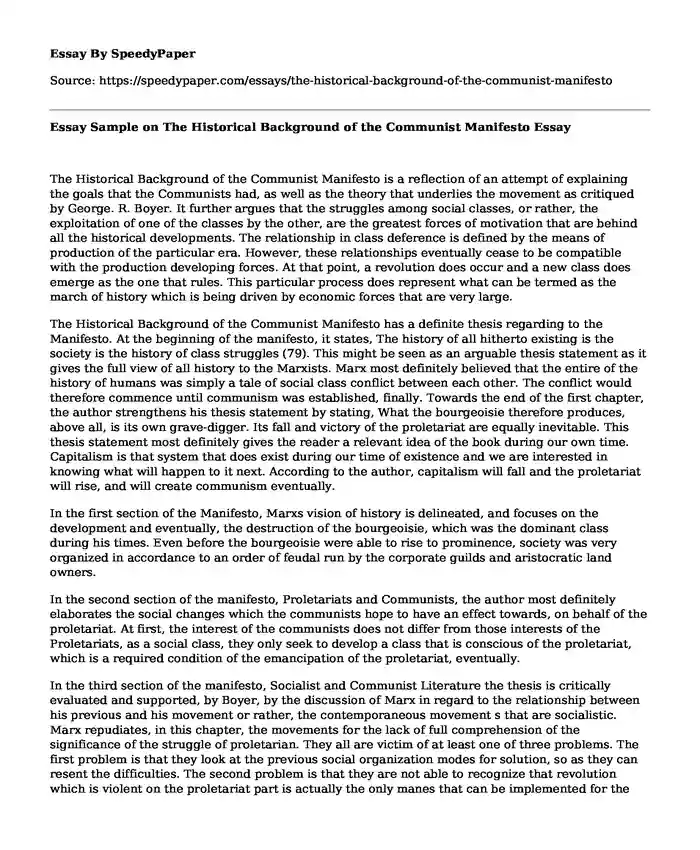
| Type of paper: | Essay |
| Categories: | History Literature Political science |
| Pages: | 4 |
| Wordcount: | 850 words |
The Historical Background of the Communist Manifesto is a reflection of an attempt of explaining the goals that the Communists had, as well as the theory that underlies the movement as critiqued by George. R. Boyer. It further argues that the struggles among social classes, or rather, the exploitation of one of the classes by the other, are the greatest forces of motivation that are behind all the historical developments. The relationship in class deference is defined by the means of production of the particular era. However, these relationships eventually cease to be compatible with the production developing forces. At that point, a revolution does occur and a new class does emerge as the one that rules. This particular process does represent what can be termed as the march of history which is being driven by economic forces that are very large.
The Historical Background of the Communist Manifesto has a definite thesis regarding to the Manifesto. At the beginning of the manifesto, it states, The history of all hitherto existing is the society is the history of class struggles (79). This might be seen as an arguable thesis statement as it gives the full view of all history to the Marxists. Marx most definitely believed that the entire of the history of humans was simply a tale of social class conflict between each other. The conflict would therefore commence until communism was established, finally. Towards the end of the first chapter, the author strengthens his thesis statement by stating, What the bourgeoisie therefore produces, above all, is its own grave-digger. Its fall and victory of the proletariat are equally inevitable. This thesis statement most definitely gives the reader a relevant idea of the book during our own time. Capitalism is that system that does exist during our time of existence and we are interested in knowing what will happen to it next. According to the author, capitalism will fall and the proletariat will rise, and will create communism eventually.
In the first section of the Manifesto, Marxs vision of history is delineated, and focuses on the development and eventually, the destruction of the bourgeoisie, which was the dominant class during his times. Even before the bourgeoisie were able to rise to prominence, society was very organized in accordance to an order of feudal run by the corporate guilds and aristocratic land owners.
In the second section of the manifesto, Proletariats and Communists, the author most definitely elaborates the social changes which the communists hope to have an effect towards, on behalf of the proletariat. At first, the interest of the communists does not differ from those interests of the Proletariats, as a social class, they only seek to develop a class that is conscious of the proletariat, which is a required condition of the emancipation of the proletariat, eventually.
In the third section of the manifesto, Socialist and Communist Literature the thesis is critically evaluated and supported, by Boyer, by the discussion of Marx in regard to the relationship between his previous and his movement or rather, the contemporaneous movement s that are socialistic. Marx repudiates, in this chapter, the movements for the lack of full comprehension of the significance of the struggle of proletarian. They all are victim of at least one of three problems. The first problem is that they look at the previous social organization modes for solution, so as they can resent the difficulties. The second problem is that they are not able to recognize that revolution which is violent on the proletariat part is actually the only manes that can be implemented for the eradication of the oppression conditions. Finally, the third problem could be that they do deny the character of the inherent class of the conflict that exists.
In the last section of the manifesto, Position of the Communist in Relation to the Various Opposition Parties, the thesis of the author is definite as it announces the intention of the communists to everywhere support every revolutionary movement against the existing social and political order of things: (120). The contribution of the communists towards the ongoing revolution of discourse will most definitely be the genesis of questions on property being raised, for a revolutionary movement that does not necessarily address the question, cant rescue people from oppression, successfully. Marx further thunders into a conclusion that Let the ruling classes tremble at a Communistic revolution. The proletarians have nothing to lose but their chains. They have a word to win. WORKING MEN OF ALL COUNTRIES, UNITE!(121).
Conclusively the thesis statement presented in the manifesto is definite as it argues that the development among classes is inevitable and that capitalism is unstable, inherently. The Communist has a major intention of the promotion f revolution, and thus, will most definitely promote the association and the parties which are merging history towards its own natural conclusion. Further, they argue that social classes elimination cannot be accomplished through changes r reforms in the government. Instead, there would be dire need of a revolution. With a Marxism system, the Communist Manifesto was and continues to be a very influential document.
Cite this page
Essay Sample on The Historical Background of the Communist Manifesto. (2019, Nov 18). Retrieved from https://speedypaper.net/essays/the-historical-background-of-the-communist-manifesto
Request Removal
If you are the original author of this essay and no longer wish to have it published on the SpeedyPaper website, please click below to request its removal:
- Leader Definition Essay Samples
- What Is Air Pollution - Essay Sample
- Essay Example: The Benefits of the Stay-at-Home Dads
- Philosophical Reflection Essay Sample
- Music Essay Sample: Basic Elements of Music and Musical Periods
- Role of Arbitrators in the Resolution of Commercial Disputes - Paper Example
- Social Media and Democracy: Navigating Political Beliefs and Participation in the Digital Age - Essay Sample
Popular categories




